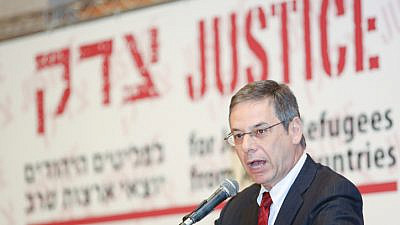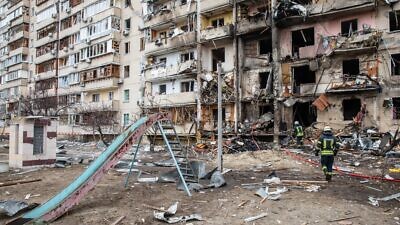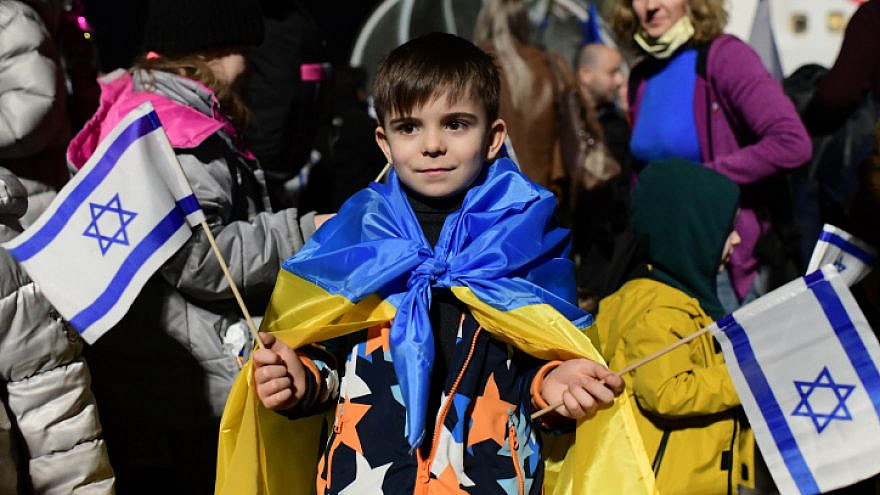Hannah Yarutskaya made aliyah as a 9th-grader in 2015 from Mariupol–the Ukrainian city destroyed by Russian occupiers in the spring of 2022.
After serving as a lone soldier in Israel’s armed forces, Yarutskaya continues to hope for the best for her birth country. During the latter part of her military service, she worked at Ben-Gurion Airport, helping the latest wave of Jewish immigrants understand the bureaucratic process.
The wave of immigration from former Soviet countries is so massive that the Jewish state is opening immigrant processing centers in countries such as Azerbaijan. Israeli officials and ordinary citizens alike seem to think this can be an economic and demographic boon for the country, just like the previous post-Soviet mass aliyah.
“I have been in contact with many new olim from the previous [immigration wave],” says Dmitry Mirsky, who moved to Israel from Russia in the late 1990s. “Both waves are a mass arrival of educated and relatively well-to-do people, financially. Back in the ’90s, the aliyah was more about Zionist ideas, it was more romantic, and there were fewer expectations. Now, a lot of the immigrants know English, they are ambitious, interesting and creative professionals. A lot of them are from Moscow and have enough money to buy luxury apartments in Tel Aviv, which wasn’t really the case last time.”

Brothers and sisters
Danny Ayalon once belonged to the Yisrael Beiteinu Party that appeals to former Soviet immigrants, and served as Israel’s deputy foreign minister in 2009-13. After that, he was the co-chairman of Nefesh B’Nefesh, an organization that helps Jews (mainly from the West) immigrate to Israel.
“I really wish they would stay here,” Ayalon told JNS. “This is their country and land, and they are received here very warmly as they should be, like our brothers and sisters. I believe the massive aliyah from the former USSR about 30 years ago was not only about personal liberation or fulfillment of historic rights, but also one of the best things that happened to Israel. By this I mean the quality of people who came and were dedicated to Israel’s security and future. This is why I oppose the ideas of some in the government to change the Law of Return.”
The new government is considering removing the so-called grandparent clause from the Law of Return, which allows anyone with at least one Jewish grandparent to become an Israeli citizen if they so choose. This would be a challenge in particular for many immigrants from post-Soviet countries.
“It may actually hasten the wave of aliyah, and I hope it does,” Ayalon remarked. “I think it can act as a catalyst, because perhaps many who fear that the law will change will make aliyah earlier beforehand. The Law of Return was a very important law for our country’s identity, was devised very carefully, and came about for two reasons: the Nazi definition of who is Jewish, which included someone with one Jewish grandparent, and the rising antisemitism that has gone global–which we have seen throughout history.”
Boarding school
Yarutskaya told JNS, “I came as a high-schooler to Israel with the Na’aleh program, which brings youth from former Soviet countries to Israel before their parents.
“I went to a boarding school. This was challenging, but I became used to it quickly because I am used to boarding schools. For some people, even strong Zionists, it is hard after building a life in a post-Soviet country to pack up and leave. But many adapt quickly and have always considered aliyah.”
During her service in the IDF Home Front Command’s Search and Rescue Brigade, Yarutskaya worked as a translator in the winter and spring months to speed up the aliyah process for Belarusian, Russian and Ukrainian immigrants.
“I speak Ukrainian and Russian. It was important for people like me to help them, to give them warmth from our hearts during this difficult time,” she told JNS. “In the first days, they didn’t know anything [about the process]. We had to go to Nof HaGalil [formerly called Upper Nazareth], a town in northern Israel, and help contact the real estate agents, find homes for these families and new olim. It wasn’t just getting them through the airport, because there was also the quarantine for coronavirus, dealing with hotels and taxis, and bank bureaucracy. It was a lot of tough work, but especially confusing for the olim.”
Mirsky is a journalist who runs the popular YouTube channel “Shalom, What’s Up?” The channel is geared towards Soviet Jews who have moved to Israel, and follows their lives in their new country through interviews and coverage of cultural events.
“I was worried about my relationship with my Ukrainian friends, that it would deteriorate [after the invasion],” Mirsky said. “But they told me: ‘We know you, we know who you are.’ Israel is a very tolerant country where people can express their opinions freely. All the [arguments] I have seen are limited to people talking on social media.”
Like most Soviet-Jewish Israelis, Mirsky is against Putin’s invasion of Ukraine.
Yarutskaya told JNS, “People, even those not in the government, are so warm. Everyone in our society is willing to help the new immigrants. I feel this is the only country that gives newcomers an absorption package and housing assistance. In other countries, nobody cares if it doesn’t work out for a new immigrant. I am so glad I was able to take part in this.”
Open hearts
Mirsky agrees, saying that most Israelis are more than willing to open their doors and their hearts to new olim from every country. There are many questions, however, about how this immigration wave may differ from the one that began in the late 1980s from the Soviet Union. In previous years, many immigrants, especially from Russia, maintained Israeli citizenship in case of emergencies but lived primarily in Russia for business reasons. Others gave up on living here and went back.
“I did see some people [during my time at the airport] from Russia who came and stayed in a hotel for a few weeks, got all the financial benefits from aliyah, and then returned home to Russia,” acknowledged Yarutskaya. “I think this is horrible and should not be tolerated, especially given the situation in Ukraine. But I also know many people who came to stay. There are people like this from every country; they miss their homes and ultimately go back because they can’t adjust to life here. There are a lot of Ukrainians who hope to be able to go back eventually. But for others, they have nothing left, and are ready to begin a new life in Israel.”
Mirsky thinks many of these new immigrants will return to their original countries when the war ends.
“Israel is not the easiest country…if the state services could’ve better coped with such a large flow of immigrants, then everything would have been wonderful. This is the Middle East, and not everyone can get used to the rhythm of life here, or the mentality. Everything is arranged differently in former Soviet countries, and people have lives there. Everything here is expensive, and it is hard for a lot of these immigrants to find work in their professions, for various reasons.”
Still, Mirsky acknowledges that a lot of the newcomers will stay.

Tel Aviv suburbs
“[Former Soviet countries] have a harsh climate, so everyone dreams of living by the sea. Many have moved to cheaper Tel Aviv suburbs to achieve this dream, and are settling in quite easily because of the established Russian-speaking population. It allows them to adapt far more easily than the previous wave.”
Ayalon also hopes the immigrants will remain.
“I think the best way [to convince them to make aliyah] is through a genuine and intensive dialogue,” he stated. “Perhaps we should have some tourism programs for potential new olim to come visit and see for themselves. Of course every individual is free to choose where they move to, but the best and perhaps only way to encourage them to come to Israel is to see for themselves. I think it’s sad when we see Jews decide to move to Germany, of all places, from other countries.”
Much of Ukraine has been destroyed as the war rages on. It is likely that the process of Ukrainian reconstruction, and instability within Russia and Belarus, will make it more difficult for olim from former Soviet countries to go back. Furthermore, it isn’t clear whether sanctions imposed by the West on Minsk and Moscow will be lifted even after the fighting stops.
And then there is the fact that antisemitism has reared its ugly head again. The Kremlin is trying to limit the activities of the Jewish Agency in order to stem the flow of Russian citizens fleeing the country. Ironically, the possible return of such an Iron Curtain is leading to an increase in Russian men (Jews among them) fleeing the mobilization orders. The outcome of the war is impossible to know, but it is clear that its effects will be with Israel and its newest post-Soviet olim for years to come.


























